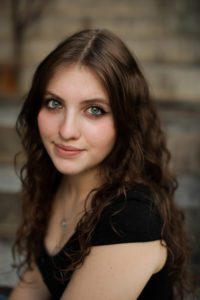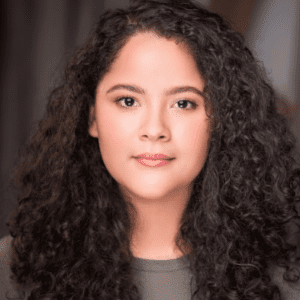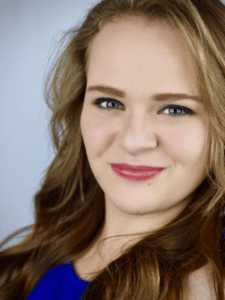By Jeilianne Vazquez & Ethan Baez
As Our Town comes to a close, we want to spotlight the backstage crew who make the magic happen. Peyton Wehunt, Prop Master, and Allison Lamb, Assistant Stage Manager, work hard on the tiny details that really make the show come to life. We asked them about their process, their perspective on the show and script, and what this show means to them.
Peyton Wehunt, BFA Design & Technology for Theatre major
Tell us about yourself and what it means to be Prop Master for Our Town.
Peyton: I’m Peyton, and I’m a sophomore here, BFA tech design with a focus in scenery and costumes. Working on Our Town props has been a lot of fun. It’s not a show that has a tremendous amount of props. It’s very mime-focused. For me, personally, I felt like those props really needed to stand out and tell their own story in their own way. So working on those props (I believe there are five), every single one of them has either been completely handmade from scratch or has been pulled from storage. For example, we have some songbooks in the show. We got them out of an abandoned church and they are from the early 1900s. It was a miracle that they weren’t torn to pieces.
All those little things have been fun and honestly, I would say, a little more challenging than the bigger shows that we do. Because in those shows I probably have a hundred props. You can say, “This is a great baby bottle, we’re moving on,” however, for something like this, those five props are gonna get seen a lot closer. The audience can say, “Why is that prop real if the others are fake? What gives it that justification?.” You’ve got to spend more time and justify its existence.
Do you just have organizational control? Or did you have any hand in actually making them?
Peyton: The work of a Prop Master is a little weird because we’re kind of what we call ourselves, and by ourselves I mean me, the “redheaded stepchild” of the backstage crew. You find yourself lumped in with Paint Charges and Board Operators, but prop masters go to production meeting, while those other positions don’t come into the process until tech week. Prop Masters deal with more design work. We do script analysis; reading the script, trying to find the meaning behind the text, making our list of everything needed for the show, researching the time period and what that time period looks like for these specific pieces. Once you get that paperwork done, you gotta go out and figure out what’s in prop storage. If we don’t have it in prop storage, can we borrow it? If we can’t borrow it, can we buy it? And then the buying is a whole process. We’re kind of in the middle because on the one hand, we don’t get to go to design meetings and we are not considered designers. But, on the other hand, we are more involved in the pre-production process than most other technical positions are. So it’s kind of a unique space!
Is part of your process removing emotion from the script, or do you like to keep it there? How long does it take? What’s your experience with that?
Peyton: That’s a great question. It’s complicated because my first read-through of a script is just to get an idea of what the show is about. I actively don’t watch shows I haven’t worked on before because I don’t want to muddy my work with somebody else’s or accidentally steals somebody’s idea. So I find myself reading through the first time just to get an idea of what the show is about, and then I read the second time to start breaking things down. For example, I am currently working on The Secret Garden. For Mary’s props, I’m going through and looking for things like what kind of person is Mary? And then I have to hone in on it. What would her doll have on it? What would a doll for her be like?
In Our Town, the newspaper bag for the paperboy gets handed down generation after generation. You really have to dive into the script and realize that this bag doesn’t just belong to the paper boy. When he leaves this job, it’s going to the next guy and it’s not gonna be a one size fits all so we have to adjust accordingly, so I make little notes about that. But really, those honed-in, fine details don’t come until I go and see a rehearsal. It’s really just words on a page until you see an actor make it come to life.
What connections do you have to this show?
Peyton: The show really does make you hone in on the idea that everything happens really fast and you’ve really got to sit down and appreciate the moments you have with people, because if you don’t, you’ll end up down the line realizing how much you regret it.
What character do you relate to the most?
Peyton: I really gravitate to Editor Webb. There’s a lot of characters that have their own personalities, but don’t get the real moments to shine, or they have a little humorous moment, but then that’s all they are, a humorous moment or a serious moment. But Editor Webb kind of falls in the middle. It’s a big bummer, because I don’t make any props for him but I really like that character! He’s not portrayed the way that you would imagine a father in the early 1900s to be. He feels like a person you would talk to now. It’s not entirely because of the script. Sammy Nelson does a terrific job of making you feel those emotions, but his connection with Emily (Maddie Compton) on stage is also really good. You can really feel that father-daughter connection between them.
Once the show starts, do you start taking your foot off the gas a little bit? Or do you have backstage duties that you’re responsible for?
Peyton: While we do get to breathe a little bit, my job isn’t done. For example, with Living Out, I focused on the heavy-hitter props, like the food, that had to get reset and cleaned and replaced every night. If it’s a show with weapons, those weapons need to be cleaned and maintained every show. You’ve got to see it through all the way to strike. You’ve got some stuff to do, but if we’re going 100 miles an hour, all the way to opening, after the show opens you’re probably going, maybe 45.
Anything that you want to tell the audience?
Peyton: I try to take one of the props and I make a little easter egg for the next show that’s coming up. In Living Out, there was a train that was sitting on the set, representing Murder On The Orient Express. There is a hint on the Our Town stage for The Secret Garden, so anybody in the audience that’s watching, see if you can try to figure out where our easter egg is! There are only five props, so I have no doubt somebody will find it.
Alison Lamb, BA Theatre major
Tell us about yourself and your role for Our Town.
Alison: I am a junior BA Theatre major and I am an Assistant Stage Manager for Our Town. Basically what that means is that I assist Kailie, our Stage Manager, help with paperwork, set up the rehearsal space, and run the show.
Have you read the show and if so, do you need to know the show to be a good stage manager?
Alison: I like to read whatever play I’m working on at least once or twice before rehearsal. I was already familiar with Our Town, but do you have to be familiar with it to be a good stage manager? Absolutely. I don’t know how you would function if you didn’t know what was happening. In order to be on top of things, you have to have a good idea. The interesting thing about tech and stage management is that when you’re reading a script, you’re looking for very different things than an actor would, because we’re in charge of tracking deck, tracking props, and tracking costumes.
Do you find any emotional relevance in the work that you do as a stage manager?
Alison: Absolutely! I can’t speak for all stage managers, but if they don’t, I’m not sure why they’re working in theatre. The emotional side is partly why I get excited about it. I mean yes, doing paperwork and stuff is very satisfying. But also at the end of the day, I’m there for the story and what the script and the play has to offer the audience and the cast, just as much as anyone else. I’m just experiencing it in a slightly different way. Stage managers are potentially reading the play even more than the actors are, because we have to analyze the script, write up paperwork and then be “on book” during rehearsal, in case an actor forgets their line. When the actors are “off book”, we’re still looking at the script in case they need a line. So we’re reading the script night after night. You pick up on a lot of details that you missed at the very beginning. That also kind of helps with motivation and passion for the work that you’re doing because you find little bits of gold here and there that you know aren’t gonna stand out. An audience might never see it but we know, and it’s so cool. In the rehearsal room, I would be sitting next to the rest of the stage management team or Zechariah (the director), and something clicks at the same time for multiple people. Then you just look over and it’s like “Wait, like did you hear that? That’s right!” So all of that is definitely emotionally grounded.
Why do you want to be a Stage Manager? What do you love about it?
Alison: Well, the interesting thing about stage management is that stage managers are one of the biggest cogs in the wheel, but also, they are one of the biggest areas that no one sees. Of course, if you’re working in professional theatre, you know how much stage management does. But for the average person, if you say, “Oh, I’m a stage manager,” they will have no idea what your role is. The idea of being such an integral part of the massive enterprise of theatre is really attractive to me because it leaves the work to speak for itself. Being behind the scenes, a kind of stage ninja. If you’re doing your job right no one knows you’re there. I’m always attracted to the people who are moving mountains and never get recognition or the people who are making the world go round but no one quite sees them do it. I think that kind of speaks to our world and how the little guy can make a difference. And just every day, seemingly small things, you know, end up changing the world.
What is a normal day as far as rehearsals look like?
Alison: Stage management usually gets to rehearsal 45 minutes before anyone else. We make sure that the stage is swept and cleaned, we preset for the show, we set up all the props, make sure everything’s in place and where it needs to be. We make sure that all of the actors are present and feeling well. If anybody’s running late then we call them and make sure that we’re helping them in any way that we can. Because of COVID, we check everybody’s temperature. Our stage manager Kailie is in the booth during runs. She is calling the show and that’s the majority of what she’s doing. Once we hit go, that’s her one big job! Makes everything go round. For ASM’s like me and Phoebe (Sweatman), we’re making sure that nothing catastrophic happens backstage. We are on headset, so we’re in constant communication with stage management and other crew members. If anything needs to be stopped or delayed, we’re all in communication to create a safe environment and to keep everybody updated.
Anything else you’d like to add?
Alison: Sometimes I think that straight plays get a bad rap. We all love the big musical that has all the dance numbers. I’m a sucker for musicals because you’ve got to love all of the pretty, shiny work that’s happening. But I think plays, like Our Town, get overshadowed which is such a shame because Our Town is such a beautiful story. It’s one of the simplest places maybe ever. Even when you walk in the space, you’ll see two ladders and the table, and it only gets simpler. In the third act, really the point of the story is seeing beautiful things in the mundane, that life is worth living because of the small moments. Truly living life, not doing crazy, big things but just simply being with each other and having community. I think that that is something that we all need reminders of.



 Costume Designer Pamela Workman is an Assistant Professor at Brenau University. She is the costume designer for GTA’s upcoming production of The Secret Garden, and recently designed costumes for
Costume Designer Pamela Workman is an Assistant Professor at Brenau University. She is the costume designer for GTA’s upcoming production of The Secret Garden, and recently designed costumes for 

